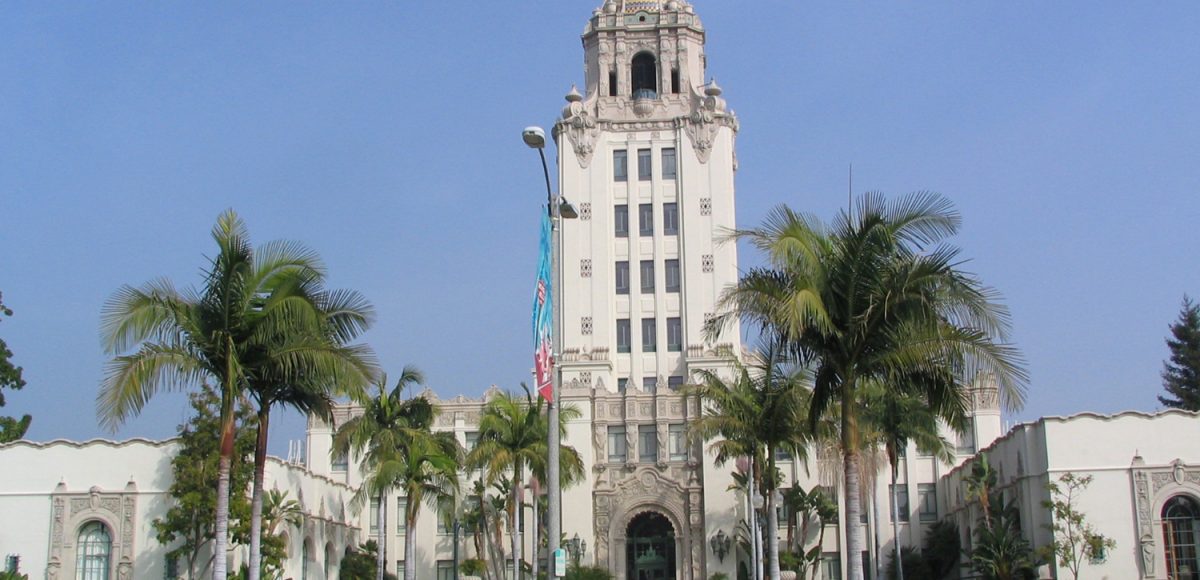At its Sept. 21 Study Session, the Beverly Hills City Council approved the continuation of outdoor dining tents for Spago and Nusr-Et through March of 2022, while also keeping the existing OpenBH program in place through the end of the calendar year. With outdoor dining in high demand and businesses reporting increased economic value in the program, the Council explored viable long-term conversions of OpenBH. Businesses such as restaurants, retail salons, and faith-based organizations participating in the program will be able to continue outdoor operations until Dec. 31, with expedited permits and fees waived.
The City Council directed staff to create a process for converting the temporary no-fee OpenBH program parklets and expanded outdoor dining uses into a long-term, fee-based program for review again this December. Considerations include timelines for approval of temporary to long-term conversions, which would be implemented throughout 2022 and creating a draft guide of design standards for parklets that would be developed using an existing contracted design firm, with outreach to stakeholders and OpenBH program participants. Additional considerations include the process for reviewing and approving parklets; code changes necessary to approve conversions; a new scaled fee structure depending on size of expansion; parklet fees and adjustments to open air dining sidewalk fees, including annual lease costs. In moving forward, the Council will split into two subcommittee groups: one would be focused on broader policy considerations, including code and fee structure changes, and another focused on design and operating standards.
In total, 134 businesses have utilized the OpenBH program since it began in June of 2020. Currently, there are 88 businesses in the program, and 30 outdoor dining street parklets. With lost revenue from waived permit fees, parking meters, and absorbing one-time traffic control costs, the fiscal impact of the current no-fee OpenBH program comes out to around $1.4 million each year.
During the public comment period, business owners, restaurant staff, patrons, residents, stakeholders, and more expressed support for OpenBH, while also highlighting concerns about parking, noise, safety, and accessibility. President and CEO of the Beverly Hills Chamber of Commerce, Todd Johnson, expressed continued support for the program and recommended removing noticing requirements for permanent outdoor dining, establishing a fee structure and more.
“Certainly, we need to continue this program in its current form until three months after permanent design standards are in place,” Johnson said. “And something that certainly everyone knows, that sitting outside and enjoying the weather that we have is wonderful, there are some loud cars that go up and down the street.”
Shallom Berkman, owner of Urth Caffé, requested that the Council continue the OpenBH program through 2022, in order to recoup losses incurred from 2020. “The outdoor seating is truly enjoyed by the community,” Berkman added. “I get numerous comments from the community about how much they love the parklet seating, and everyone hopes that it will continue.”
“I do think we need to improve the crowd control,” Spago General Manager Steve Scott Springer said. “Sometimes when volume increases, the crowd control can get a little out of control.” Springer shared he has seen an increase in marijuana smoking, adding “we don’t want our guests walking through all of that.”
“We are hopeful that the OpenBH program remains in effect for at least another year, and that Spago and other businesses can recoup their substantial investments in creating outdoor dining,” Barbara Lazaroff, co-owner of Spago, said. “We accept that when construction commences for the North portal on Beverly, the Canon art wall will need to be removed and therein, our pavilion as well. We hope to plan for other solutions prior to that point.”
The City Council unanimously agreed that open air dining was, and continues to be, a success in Beverly Hills. The Council was uniform in supporting a reimagined version of OpenBH, with reformulated policy, design standards for parklets, and code and fee structure changes related to outdoor dining.
“I love OpenBH, but when you eat out, it can feel like you’re eating next to a freeway,” Mayor Wunderlich said. “There’s the noise issue, there’s the safety issues, there’s the mobility issues that have been brought up. And so those also are things that I think it will be good for us to consider in these conversations going forward.”
“Many, including me, are delighted by the OpenBH program,” Wunderlich concluded. “And to be permanent, though, we do need to consider the issues that were discussed today.”







